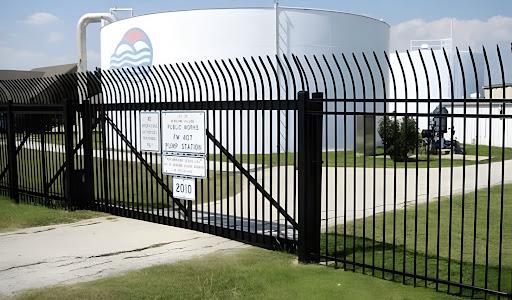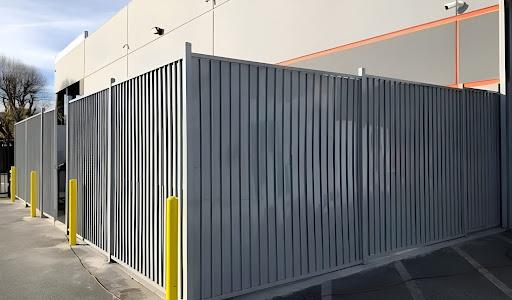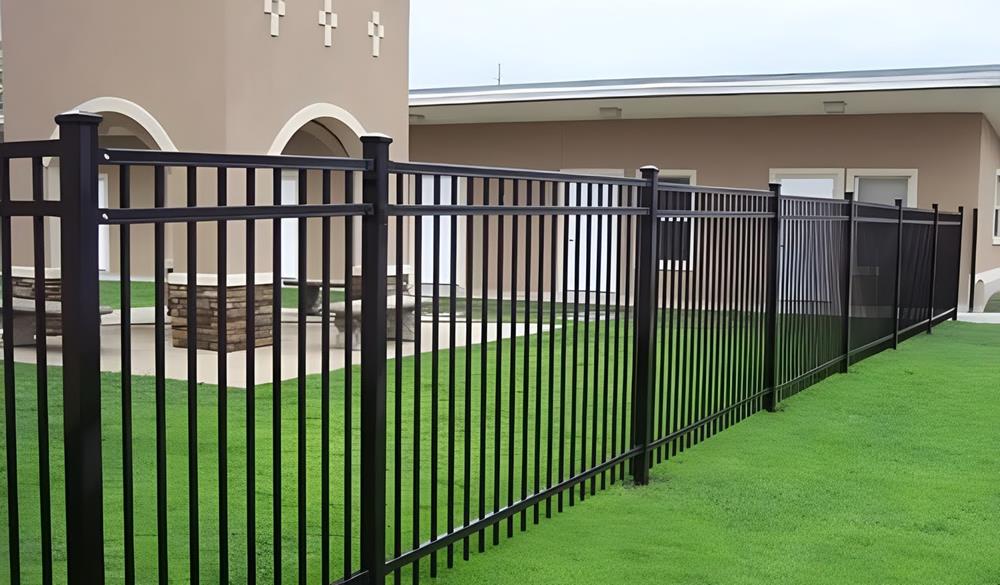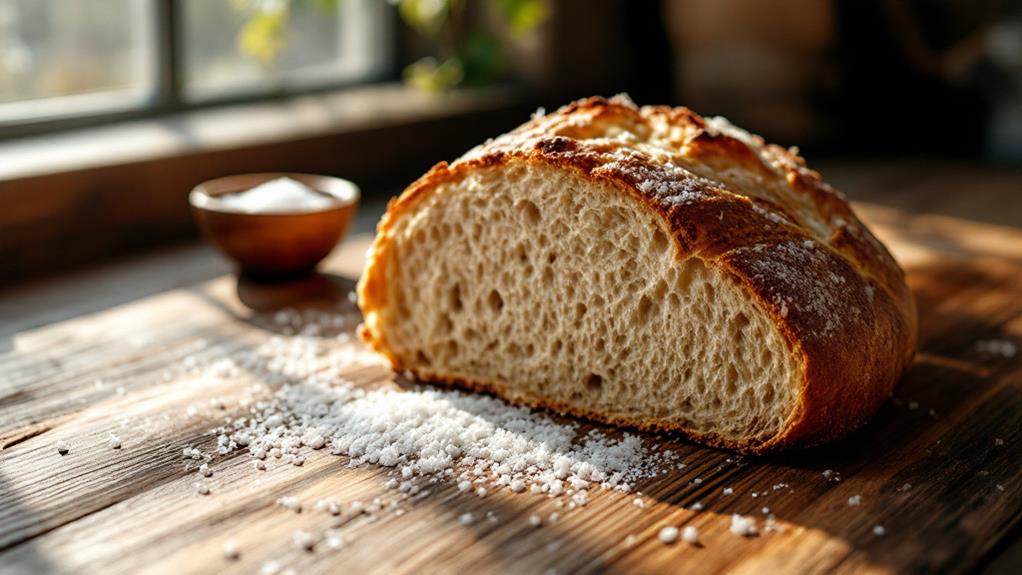What’s the Difference Between Residential and Commercial Fencing?

Securing properties requires different fencing types for homes and businesses. Businesses need fencing that boosts security and looks good. It should also define their space well.
Commercial fencing focuses on security, protecting assets, and looking good. The right fence can keep a business safe and make it look better.
Key Takeaways
- Commercial fencing is much different from home fencing in security and function.
- The right fence & gates can make a business look better.
- Commercial fencing meets the needs of businesses and organizations.
- Keeping things safe and protecting assets is key to commercial fencing.
- How a fence looks is also very important.
Understanding the Purpose of Commercial Fence & Gates
Commercial fencing does more than just mark a property's edge. It plays a key role in security, meets legal standards, and shapes a brand's image. It's vital for protecting a business's assets and keeping its people and customers safe.

Security Requirements for Commercial Properties
Every business has its own security needs. For example, a factory might need industrial perimeter fencing to safeguard its big machines. On the other hand, a shop might focus on installing a secure commercial gate to keep its area safe when it's closed.
Regulatory Compliance Considerations
Businesses must follow local rules and zoning laws about fencing. These rules cover things like how tall the fence can be, what materials to use, and how it should be installed. Staying in line with these rules helps avoid fines and legal trouble.
Brand Image and Aesthetic Considerations
A commercial fence is not just for function; it also affects a company's image. The fence's design, material, and color can either boost or harm a property's look. For instance, a stylish fence with commercial property security gates can make a business more welcoming to visitors.
Knowing the many roles of commercial fencing helps businesses choose the right fencing. It should meet their security, legal, and beauty needs.
Key Differences in Materials Between Residential and Commercial Fencing
Commercial properties need fencing that's tough and fits their security and look. This is different from home fencing, which focuses more on looks and privacy. Commercial fencing must be strong and meet the needs of the business.

Commercial-Grade Materials and Durability Standards
Commercial fencing uses strong materials like chain link, vinyl, aluminum, and wrought iron. Vinyl fencing is durable and easy to care for, making it popular for businesses. Using strong gate materials helps the fence last longer and cuts down on repair costs.
Residential Fencing Material Options
Home fencing often uses wood, vinyl, and aluminum for its looks and to improve the home's appearance. While it's durable, it doesn't need to be as strong as commercial fencing.
Cost-Benefit Analysis of Different Materials
When picking fencing, think about the upfront cost and long-term value. A cost-benefit analysis helps choose the right material for your property.
Lifespan Comparisons
Commercial materials last longer than residential ones. For example, a commercial vinyl fence can last 20 years or more with care. Home wood fences might need to be replaced or fixed in 10 to 15 years.
Weather Resistance Factors
Weather resistance is key when picking fencing. Commercial fencing is made to handle bad weather like rain, snow, and extreme heat. This keeps the fence looking good and working well over time.
Knowing the differences in materials helps businesses choose the right fencing. They can pick custom commercial designs that fit their needs.
Height and Security Features: Commercial vs. Residential
Commercial properties need different fencing than homes, especially in height and security. Commercial fences are taller and more secure. They protect assets and employees.
Standard Height Requirements for Commercial Properties
Commercial fences can be 6 to 12 feet or more tall. This depends on the property's security needs. For example, a contractor might suggest a taller fence for a warehouse to stop unauthorized access.
Security Enhancements for Commercial Fencing
Commercial fences often have barbed wire, CCTV, and access control. Regular maintenance of commercial gates is key. It ensures these features work correctly.
Residential Height Restrictions and Neighborhood Considerations
Residential fences face local rules and neighborhood rules. These usually limit fences to 4 to 6 feet tall. Homeowners must think about these rules when picking a fence.
Local Zoning Regulations
Local rules are key in deciding residential fence height and design. Homeowners should check local government rules before installing a fence.
Commercial Fence & Gates: Design and Functionality
Creating effective commercial fencing needs careful planning. It must meet security, accessibility, and traffic flow needs. We consider the property's type, foot traffic, and vehicle access when designing.
Traffic Flow Considerations for Commercial Properties
Traffic flow is key in commercial fence design. We aim for smooth entry and exit for vehicles and pedestrians. This might mean separate gates or special gates like slide or cantilever gates for high traffic.
Accessibility Requirements and ADA Compliance
Commercial fencing must follow accessibility standards, like the ADA. We make sure our designs have accessible paths and gates. These are wide and easy to open for people with disabilities.
Integration with Security Systems
A good commercial fence and gate system works with other security features. This includes video surveillance and access control systems. It boosts the property's overall security.
Video Surveillance Compatibility
Our fence designs can work with video surveillance systems for better security. Cameras are placed at key spots, like gate entrances and around the perimeter.
Access Control Integration
Access control systems fit well with our fence and gate designs. This includes electronic gate operators, keycard access, and biometric authentication.
By thinking about these factors, we create a fence and gate system that's both functional and secure. It meets the property's unique needs.
Gate Automation: Commercial vs. Residential Solutions
Automated gates are common in many places, but they differ a lot between commercial and home use. In commercial settings, gate automation boosts security and makes things easier.
Heavy-Duty Commercial Gate Operators
Commercial gate operators are built to last, handling lots of traffic. They are stronger than those for homes, making them reliable for access control.
Access Control Systems for Business Properties
Access control systems are key for commercial gate automation. They let businesses control who comes in. These systems work well with other security setups, offering strong protection.
Residential Gate Automation Options
Residential gate automation is not as strong as commercial, but still has benefits. It adds convenience and security to homes. Homeowners can pick from many automation options, including smart home features.
Smart Home Integration
Smart home integration lets homeowners control their gates from their phones or other devices. This adds more convenience and security to homes.
In summary, commercial and residential gate automation have big differences. These reflect the unique needs of each area. Knowing these differences helps property owners choose the right gate automation for their needs.
Industry-Specific Commercial Fencing Solutions
Looking into commercial fencing for different industries shows we need a custom approach. Each sector has its own needs, like security, looks, and rules to follow.
Manufacturing and Industrial Facility Requirements
Manufacturing and industrial places need strong fencing that can handle tough conditions and keep things safe. Industrial perimeter fencing is key here. It stops unwanted visitors and guards important stuff.
The fences for these areas are made to last. They use strong materials like steel and iron. This makes them tough and long-lasting.
Retail and Commercial Property Considerations
Retail and commercial spots need fences that are not just safe but also look good. Commercial property security gates are made to look nice and work well. They often show off the business's style.
Educational and Healthcare Facility Fencing Needs
Schools and hospitals need fences that keep everyone safe and easy to get in and out. The fences must protect kids, patients, and staff. They also have to follow the rules.
Safety and Security Priorities
In schools and hospitals, fences must balance safety with easy access. This means having secure gates and systems to control who comes in.
By knowing what each industry needs, we can create fencing that's safe, secure, and looks good. It meets and goes beyond what's expected.
Hiring Professionals for Fencing Installation
Installing a fence, whether for a home or business, requires careful planning and technical skill. Professional installers ensure that your fencing system meets safety standards, local regulations, and design goals. They have the tools and experience to manage complex installations, including automated gates and integrated security systems.
Hiring professionals also helps avoid common issues such as uneven alignment, weak foundations, or improper material use. Experts can assess your property's layout, recommend the best materials for your environment, and ensure your fence and gates function properly for the long term.
For commercial projects, professionals understand how to balance security with accessibility, ensuring compliance with zoning and industry standards. For residential properties, they focus on aesthetics and functionality, creating fences that enhance both privacy and curb appeal.
Working with qualified installers gives property owners peace of mind, knowing their investment will be durable, secure, and visually appealing. Professional installation ensures that both commercial and residential fencing performs as intended and lasts for many years.
Maintenance Considerations for Commercial and Residential Fencing
Maintenance is key for both commercial and residential fencing. It affects their durability and performance. Regular care helps extend the fence's life and keeps it working well.
This is true whether the fence is securing a business or adding beauty to a home.
Commercial Maintenance Schedules and Requirements
Commercial fencing needs more upkeep than residential fencing. This is because it faces more traffic and use. Regular checks for damage and wear are a must.
It's also important to make sure all security features work properly. Using strong materials for gates can cut down on repair needs.
Residential Upkeep Best Practices
Residential fencing upkeep focuses on keeping it looking good and in shape. This includes cleaning, checking for damage, and fixing small issues. Applying protective coatings can also help make the fence last longer.
Cost Factors: Commercial vs. Residential Fencing Projects
When comparing the cost of commercial and residential fencing, several key elements come into play. The total cost depends on materials, design complexity, and installation needs.
Initial Investment Comparisons
Commercial fencing projects cost more upfront than residential ones. This is because they use heavy-duty materials and have more complex installations. For example, commercial properties need secure gates to keep their premises safe.
Long-term Value and ROI Considerations
Even though commercial fencing costs more at first, it offers long-term benefits. These include better security, higher property value, and a stronger brand image. These advantages can lead to a good return on investment.
Financing Options for Commercial Fence Projects
There are many financing options for commercial fence projects. This helps businesses handle their initial costs. We can find financing that fits the needs of commercial property owners. This way, they can get the fencing they need without overspending.
Conclusion: Making the Right Choice for Your Property
Choosing the right fencing is key for both business and home properties. Knowing the difference between commercial and residential fencing helps owners make smart choices that improve security, appearance, and function.
Commercial fences and gates are crucial for business security. When selecting a commercial fence, think about security needs, regulations, and your brand's image. These gates add extra protection while maintaining proper access and traffic flow.
We have looked at the main differences between commercial and residential fences, including materials, height, and security features. By considering these factors and hiring professionals, property owners can choose fencing that fits their specific needs. Whether for safety, style, or performance, the right commercial or residential fence is an investment that enhances and protects your property for years to come.




